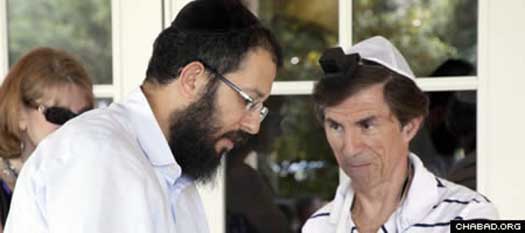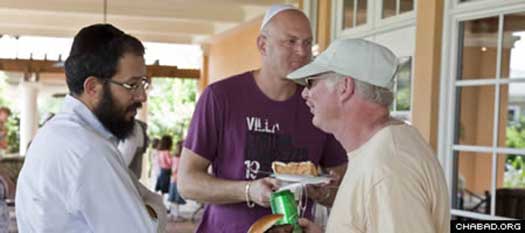
Rabbi Inspired by Life in Rural Florida
Rabbi Yossi Eber is a hard person to miss. Walking through the aisles of a neighborhood grocery store with his long beard, velvet kippah (skullcap) and black suit, it’s obvious that he’s not from the area. Typically, people come to a new place and try to blend in. But being a Chabad-Lubavitch rabbi, he must maintain a certain look—a look that’s far from the norm in this part of Florida.
“It’s an awesome privilege. But it’s also not easy in such a place,” Eber admits.
This is Trinity, Fla., a suburban enclave near Tampa, peppered with cow pastures and strip malls, beautiful beaches and gated communities, trailer parks and golf courses. It’s five hours across the state, from Miami, home to a longtime and significant Jewish population. It’s also two hours from Orlando, home to world-famous amusement and theme parks, and which also has a sizable Jewish community.
When Eber and his wife, Dina, moved to the area more than seven years ago, they knew it wouldn’t be easy to leave behind family, friends and their support network in New York to make their home in Pasco County, Fla.
Since arriving, their family has grown from one child to six. The couple is raising their Torah-observant children without the religious framework that exists in cities and towns with a Jewish presence.
“When you’re living around here, and my husband walks into a store with a yarmulke and beard, you can’t miss him,” said Dina Eber, who is originally from France, where her father serves as a spiritual dean for a yeshivah.
People tend to turn their heads to catch a glimpse of the young rabbi, looking a bit old-fashioned, his attire out of place in the middle of a Florida summer. Some will come up to him and ask who he is, where he came from and why he’s there.
The answer is simple yet profoundly deep: to reach out to Jews who may not otherwise have any connection to their religion.
Touching Lives Daily
For some, seeing him is like a glimpse into family history; he reminds them of a relative from another time and place, familiar and welcoming. For younger Jews, he presents a different kind of link; he offers a first-time chance to connect with a rich and meaningful heritage, to learn traditions that have long been forgotten—traditions many never knew existed.
And for others, he is simply a gracious host, inviting them for a home-cooked meal with a close-knit family.
Each person who comes to the Shabbat table is special, according to Eber. He or she has a unique story and background. The Ebers try to make every guest feel precious and important, simply because they are Jewish.
The Ebers touch lives daily from their modest, 1,500-square-foot synagogue positioned in a local strip mall. Its mirrored front says simply: Chabad Jewish Center of West Pasco. The building itself reveals little of what goes on inside.
But it doesn’t take big, flashy buildings and extravagant facades to do great work, says the rabbi. Every neshama, every Jewish soul that the Ebers touch is important—something they learned from the Rebbe, Rabbi Menachem M. Schneerson, of righteous memory. It’s that concept that keeps the Ebers going, day in and day out.
It’s obvious from the moment guests enter the front door that the Eber home is like no other in the vicinity. It is, however, a typical Chabad home. Instead of a wall-mounted, large-screen television are floor-to-ceiling bookshelves, double-lined with holy books in all shapes and sizes. Some are in Hebrew or Yiddish; others are in English. A large, framed picture of the Rebbe peers down from the wall near the dining-room table. Giggling children wearing fancy Shabbat clothes excitedly come to the table when it’s time to light candles, bless the bread and wine, and start the festive Shabbat meal.
People who come to the Eber home and synagogue say they learn as much from the children as they do from their parents.
George Keim, of Trinity, says soon after the Ebers arrived in Pasco, the rabbi pulled up in a large white van to Keim’s home to deliver some handmade shmurah matzah for Passover. “I thought, wow, this is nice, but where did this guy come from?” Keim recalls.
The two men chatted for a while and stayed in touch, but it wasn’t until three years later that Keim decided to make a visit to Chabad. First, it was a Chanukah party, then a Shabbat service. Now, he attends regularly.
“I didn’t grow up around people who observed,” he says. “But Rabbi Eber’s just very down to earth. And I think he takes the time to really get to know people.”
Like others who frequent the Chabad center, it’s the Eber family as a whole that really impresses them. “I like seeing the way he interacts with his wife and children,” Keim says. “He makes you appreciate the things that are really important.”

Connecting to the Source
Indeed, it’s the little things in life that can make all the difference.
Eber says he learned this attitude—that every good deed, no matter how small, can make a huge impact in a person’s life—from the Rebbe himself.
Growing up in the Crown Heights neighborhood of Brooklyn, N.Y., Eber spent a lot of time at Chabad-Lubavitch headquarters at 770 Eastern Parkway. For hours, the Rebbe would give out nickels for children to give to charity. “I got a lot of nickels from the Rebbe. Thinking back now, which world leader says, ‘I’m dedicating my time only to children now during these hours?’
“For the Rebbe, every mitzvah makes a difference. He was not about looking for big buildings and making a splash. He was about connecting, touching every single person, Jews and non-Jews.”
Many Chabad shluchim, or emissaries, like the Ebers got their start by doing outreach in sometimes far-flung communities as students, and then returning to those communities following ordination and marriage.
“So it’s not something foreign to us. But the responsibility is greater because we are raising money and raising a family,” says Eber.
More than 4,000 Chabad rabbis and rebbetzins live and work around the world, reaching out to unaffiliated Jews, inviting them for Shabbat meals, offering to wrap tefillin with them, holding classes and serving as spiritual role models for those who might not otherwise get the chance to connect with their Judaism.
While he may stand out among the crowd, it gives him—and rabbis like him—the unique opportunity to affect even the most distant Jews.
“On the flip side, you see some amazing scenes,” he says. “You see the appreciation in people’s eyes. You see how important the work is,” says Eber. “It’s such a remote place, so I think I experience that a little more. But really, this can happen anywhere.”
Eber acknowledges that it’s not always easy to stay positive. It’s a difficult world, he says, and not everyone openly appreciates what he’s doing. When the pressure gets to him, he prays, studies and watches videos of the Rebbe. “When the going gets tough, you study more,” he believes.
“That’s what brings you back, but really, it’s ingrained in you,” growing up in a religious environment, he explains. “Even so, you have to study every day. When you study Torah, it keeps you connected to the source.”
Eber can tell so many stories about connecting. He met a family at the public menorah-lighting a couple of years ago. Like many in the area, the mother is Jewish, and the father is not. The father said he wanted their kids to attend the Ebers’ Hebrew school, but life got busy and they never followed through with enrollment.
Recently, the rabbi was at the grocery store shopping for Shabbat items.
The father spotted him and immediately went over to talk with him. He said he had told his wife that one way or another, their kids need to have G-d in their life.
The rabbi said to come Sunday, with the family, and they would “make a bar mitzvah” for their now 13-year-old son. During the ceremony, the boy put on a tallis and tefillin; recited the Shema prayer in Hebrew and English; and Eber tried to explain in a short amount of time what it means to be Jewish. The boy quipped that since he was only half-Jewish, the ceremony should take half the amount of time.
“You’re not half-Jewish; if your mother is Jewish, you’re Jewish,” Eber said. And with that, he added, comes both a responsibility and a privilege.
He then presented Shabbat candle-lighting kits to the boy’s mother and sister, and arranged to get a set of tefillin for the 13-year-old.
“I am going to make sure, that an hour before sundown, my wife and daughter will light,” the boy’s father said in a kind, yet adamant, way.
Eber says he often thinks about that chance encounter, as well as other experiences meeting people in random places—at coffee shops, at the dry cleaners. Sometimes, it’s just a kind word or a smile, but he says he never knows what can make a difference in someone’s life, no matter how small the gesture.
“These things inspire me,” he says.
People outside of Pasco County help the rabbi and his wife financially. Even if they’ve never met the Ebers and don’t know anyone in their community, they recognize the importance of what they are doing.
“People give just because of the Rebbe’s vision–people who don’t know anyone here,” says Eber. “It’s beautiful.”














wow
great story about such wonderful shluchim !!
and the goy is tschepping his jewish wife and daughters to do mitzvos and for his son to put on tefilin.
moshiach zol shoyn kumen, nu
wow!
This is where Shlichus takes the greatest stance! When there is mamash nothing, and they connect Yiddishe lives to a love of Torah and Mitzvos at every second!
Keep it up!
A Lubav Admirer from Lakewood!